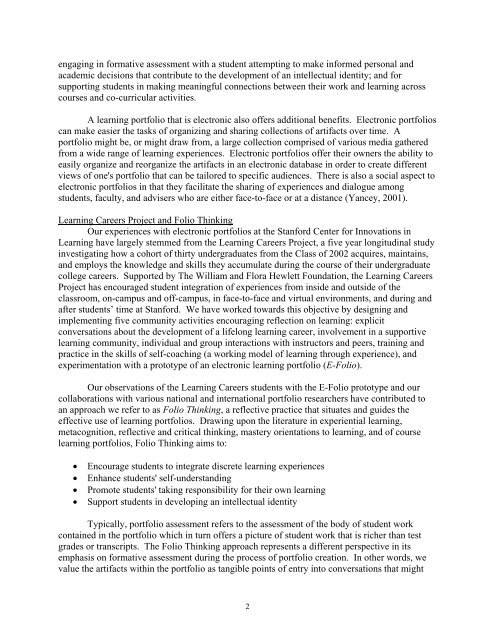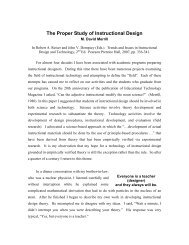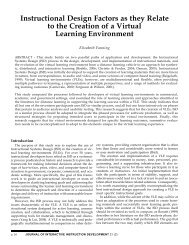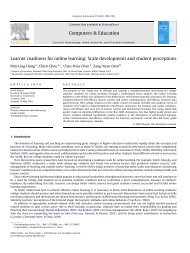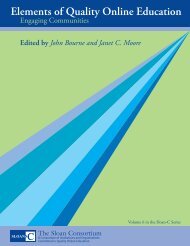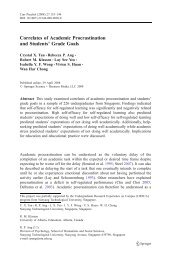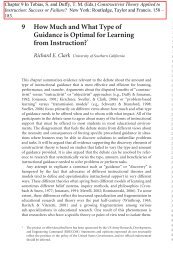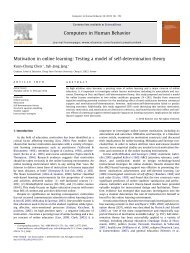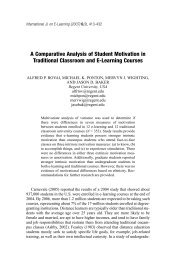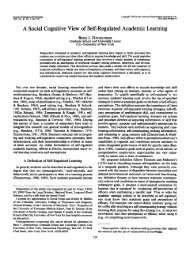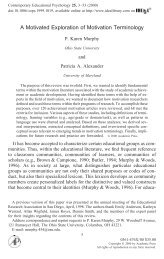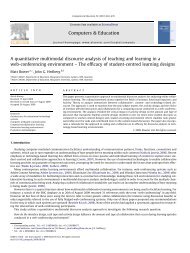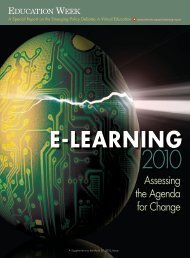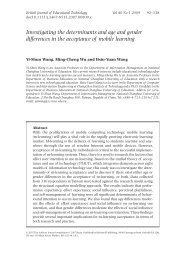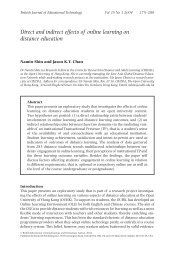Electronic Learning Portfolios and Student Affairs - Montgomery ...
Electronic Learning Portfolios and Student Affairs - Montgomery ...
Electronic Learning Portfolios and Student Affairs - Montgomery ...
You also want an ePaper? Increase the reach of your titles
YUMPU automatically turns print PDFs into web optimized ePapers that Google loves.
engaging in formative assessment with a student attempting to make informed personal <strong>and</strong>academic decisions that contribute to the development of an intellectual identity; <strong>and</strong> forsupporting students in making meaningful connections between their work <strong>and</strong> learning acrosscourses <strong>and</strong> co-curricular activities.A learning portfolio that is electronic also offers additional benefits. <strong>Electronic</strong> portfolioscan make easier the tasks of organizing <strong>and</strong> sharing collections of artifacts over time. Aportfolio might be, or might draw from, a large collection comprised of various media gatheredfrom a wide range of learning experiences. <strong>Electronic</strong> portfolios offer their owners the ability toeasily organize <strong>and</strong> reorganize the artifacts in an electronic database in order to create differentviews of one's portfolio that can be tailored to specific audiences. There is also a social aspect toelectronic portfolios in that they facilitate the sharing of experiences <strong>and</strong> dialogue amongstudents, faculty, <strong>and</strong> advisers who are either face-to-face or at a distance (Yancey, 2001).<strong>Learning</strong> Careers Project <strong>and</strong> Folio ThinkingOur experiences with electronic portfolios at the Stanford Center for Innovations in<strong>Learning</strong> have largely stemmed from the <strong>Learning</strong> Careers Project, a five year longitudinal studyinvestigating how a cohort of thirty undergraduates from the Class of 2002 acquires, maintains,<strong>and</strong> employs the knowledge <strong>and</strong> skills they accumulate during the course of their undergraduatecollege careers. Supported by The William <strong>and</strong> Flora Hewlett Foundation, the <strong>Learning</strong> CareersProject has encouraged student integration of experiences from inside <strong>and</strong> outside of theclassroom, on-campus <strong>and</strong> off-campus, in face-to-face <strong>and</strong> virtual environments, <strong>and</strong> during <strong>and</strong>after students’ time at Stanford. We have worked towards this objective by designing <strong>and</strong>implementing five community activities encouraging reflection on learning: explicitconversations about the development of a lifelong learning career, involvement in a supportivelearning community, individual <strong>and</strong> group interactions with instructors <strong>and</strong> peers, training <strong>and</strong>practice in the skills of self-coaching (a working model of learning through experience), <strong>and</strong>experimentation with a prototype of an electronic learning portfolio (E-Folio).Our observations of the <strong>Learning</strong> Careers students with the E-Folio prototype <strong>and</strong> ourcollaborations with various national <strong>and</strong> international portfolio researchers have contributed toan approach we refer to as Folio Thinking, a reflective practice that situates <strong>and</strong> guides theeffective use of learning portfolios. Drawing upon the literature in experiential learning,metacognition, reflective <strong>and</strong> critical thinking, mastery orientations to learning, <strong>and</strong> of courselearning portfolios, Folio Thinking aims to:• Encourage students to integrate discrete learning experiences• Enhance students' self-underst<strong>and</strong>ing• Promote students' taking responsibility for their own learning• Support students in developing an intellectual identityTypically, portfolio assessment refers to the assessment of the body of student workcontained in the portfolio which in turn offers a picture of student work that is richer than testgrades or transcripts. The Folio Thinking approach represents a different perspective in itsemphasis on formative assessment during the process of portfolio creation. In other words, wevalue the artifacts within the portfolio as tangible points of entry into conversations that might2


